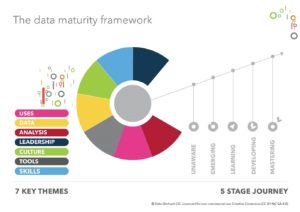
Sian Basker from Data Orchard discusses organisational data maturity, a tool to assess it and their recently-launched ‘State of the Sector’ report.
Data Orchard has been researching organisational data maturity since 2015. By ‘Data Maturity’ we mean an organisation’s journey towards improvement and increased capability in using data. After the first two years exploring what ‘poor’, ‘good’ and ‘great’ looked like (with qualitative in-depth under-the-bonnet exploration, and quantitative research), we published our first theoretical model in 2017.
The reality is that data is both complex and complicated. For this very reason a considerable proportion of people really dislike it, including leaders. In 2019 Data Orchard launched the world’s first data maturity assessment tool for the not-for-profit sector. Since then it’s been used by thousands of people from non-governmental organisations, the public sector, and universities (and quite a lot of commercial organisations too). The latest findings validate earlier research: Most leaders don’t see the value of data and are not able to use it to inform their decision-making.
The Data Maturity Framework
Data Orchard’s Data Maturity Framework identifies seven key themes that influence how an organisation advances in its maturity.
Three of them are specifically about people: Leadership, Culture and Skills. The others are about purpose (Uses and Analysis) and the practicalities (Data and Tools). But, in reality ALL of it is about people, since
- people make the decisions about how data is used and analysed for what purpose
- people make the decisions about what data collect (from who, where and how) and how to nurture and look after it (or not)
- And people make decisions about what tools they’re going to use to analyse and present it.
…which is why one of the most interesting findings about data maturity is the importance of culture. Culture is the most significantly correlated of the seven key themes (tools is the least significant). Top of the correlations rankings is ‘Culture and Leadership’, followed by ‘Culture and Data’ and ‘Culture and Skills’
And what is culture all about? Broadly, at a societal level it’s about behaviour, language, values and beliefs. In the context of data maturity it describes behaviours and attitudes around openness, protection, team approach and self-questioning.
These 15 characteristics describe organisations that have reached the mastering stage for culture:
- Data seen as a team effort and critical asset for every part of the organisation.
- Everyone in the organisation is committed to ensuring quality data is available to support decision-making.
- Staff are very comfortable using data to ask difficult and complex questions, to challenge practices and preconceived notions about the past and future.
- People are aware of the practical difference between: correlation and causality; attribution and contribution; ‘known and unknown’ unknowns.
- They explore potential negative impacts of interventions as well as data ethics.
- Internal openness and data sharing is fundamental to the culture, subject to
data protection/security. - Everyone can access analysis they need when they need it.
- Data insights/evidence are publicly available.
- There’s extensive data sharing, with protocols in place with partners, networks, stakeholders to address shared problems and solutions.
- Data may be shared with clients as part of service/support.
- There are high levels of confidence about the security of data held in the organisation.
- Systems, automated if possible, are in place to delete personal data no longer necessary and respond to subject access requests.
- Risks are monitored and tested to improve data security and protection.
- Data knowledge and skills sharing is widespread.
- Board and senior management keep abreast of future changes in legislation
and best practice, and regularly check Data Protection compliance.
Why data maturity models?
The whole point of data maturity models is that they aim to simplify complexity. Maturity models evolve primarily from the quality management field and enable organisations to be measured and compared. Most are designed as a way of promoting best practice with the ultimate purpose of learning and improvement.
This is precisely what Data Orchard’s Data Maturity Assessment seeks to do and is increasingly effective at achieving. The theory of change is that it is primarily a tool for learning which promotes discussion, creates shared thinking and a common ‘language’ for people to talk about data in their organisation. Ultimately it’s a catalyst for action, inspiring and motivating people into work together to improve. You can read more about the impact of Data Orchard’s data maturity assessment tool in their latest impact report.
You can try out the free data maturity assessment here. Data Orchard published it’s second annual ‘State of the Sector, Data Maturity in the Not-for-Profit Sector’ report in September 2022. You can watch the webinar, read the blog and access the full report here.
About the Author
Sian is Co-Chief Executive of Data Orchard, a social enterprise whose primary focus is on building organisations’ data capabilities and helping them achieve greater impact.
Since 2015, she has led Data Orchard’s pioneering national and international research on data maturity in the not-for-profit sector. Sian has previously held senior and leadership roles in business development, digital strategy, impact measurement with local, national, and international charities (plus a couple of stints in renegade academic research units).
Sian has an MSc in ‘Data Science and Analytics’ and a BSc Hons in ‘Mathematics and Science & Technology Policy’ and her roots are in digital access and inclusion. She helped create the UK’s first public internet access programmes in the early 1990s; and co-founded the first women’s online resource centre. She spent over twenty-five years exploring new frontiers in digital technology and bringing the benefits to the non-profit sector before her more recent (2010) career epiphany when she was re-born as a ‘data champion’.

